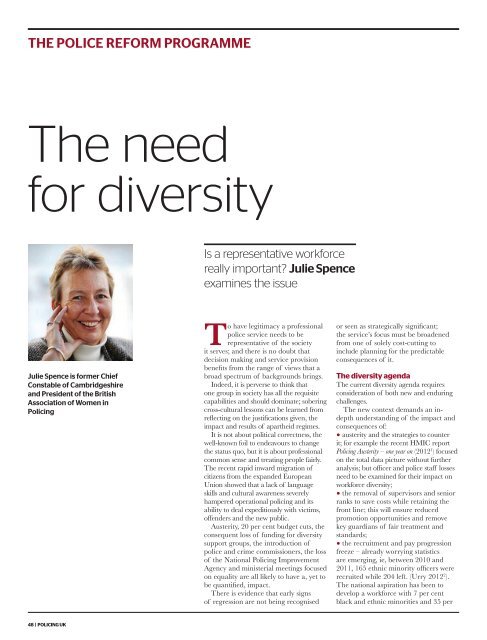Policing UK 2013 - Police Federation
Policing UK 2013 - Police Federation
Policing UK 2013 - Police Federation
Create successful ePaper yourself
Turn your PDF publications into a flip-book with our unique Google optimized e-Paper software.
THE POLICE REFORM PROGRAMME<br />
The need<br />
for diversity<br />
Is a representative workforce<br />
really important? Julie Spence<br />
examines the issue<br />
Julie Spence is former Chief<br />
Constable of Cambridgeshire<br />
and President of the British<br />
Association of Women in<br />
<strong>Policing</strong><br />
To have legitimacy a professional<br />
police service needs to be<br />
representative of the society<br />
it serves; and there is no doubt that<br />
decision making and service provision<br />
benefits from the range of views that a<br />
broad spectrum of backgrounds brings.<br />
Indeed, it is perverse to think that<br />
one group in society has all the requisite<br />
capabilities and should dominate; sobering<br />
cross-cultural lessons can be learned from<br />
reflecting on the justifications given, the<br />
impact and results of apartheid regimes.<br />
It is not about political correctness, the<br />
well-known foil to endeavours to change<br />
the status quo, but it is about professional<br />
common sense and treating people fairly.<br />
The recent rapid inward migration of<br />
citizens from the expanded European<br />
Union showed that a lack of language<br />
skills and cultural awareness severely<br />
hampered operational policing and its<br />
ability to deal expeditiously with victims,<br />
offenders and the new public.<br />
Austerity, 20 per cent budget cuts, the<br />
consequent loss of funding for diversity<br />
support groups, the introduction of<br />
police and crime commissioners, the loss<br />
of the National <strong>Policing</strong> Improvement<br />
Agency and ministerial meetings focused<br />
on equality are all likely to have a, yet to<br />
be quantified, impact.<br />
There is evidence that early signs<br />
of regression are not being recognised<br />
or seen as strategically significant<br />
the service’s focus must be broadened<br />
from one of solely cost-cutting to<br />
include planning for the predictable<br />
consequences of it.<br />
The diversity agenda<br />
The current diversity agenda requires<br />
consideration of both new and enduring<br />
challenges.<br />
The new context demands an indepth<br />
understanding of the impact and<br />
consequences of:<br />
austerity and the strategies to counter<br />
it; for example the recent HMIC report<br />
<strong>Policing</strong> Austerity – one year on (2012 1 ) focused<br />
on the total data picture without further<br />
analysis but officer and police staff losses<br />
need to be examined for their impact on<br />
workforce diversity<br />
the removal of supervisors and senior<br />
ranks to save costs while retaining the<br />
front line this will ensure reduced<br />
promotion opportunities and remove<br />
key guardians of fair treatment and<br />
standards;<br />
the recruitment and pay progression<br />
freee – already worrying statistics<br />
are emerging, ie, between 2010 and<br />
2011, 165 ethnic minority officers were<br />
recruited while 204 left. (Urry 2012 2 ).<br />
The national aspiration has been to<br />
develop a workforce with per cent<br />
black and ethnic minorities and 35 per<br />
48 | POLICING <strong>UK</strong>
















